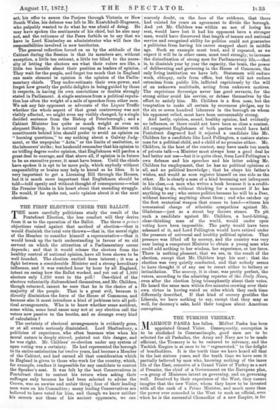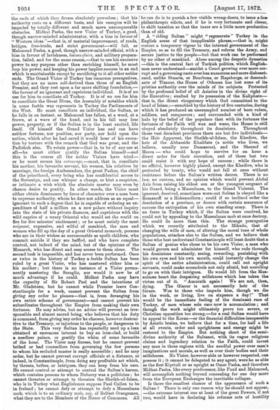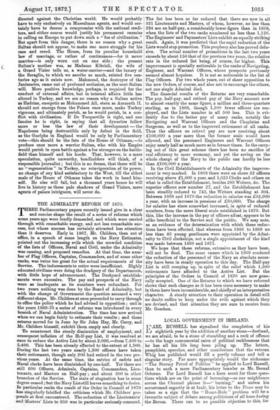THE TURKISH VIZIERAT.
nAHMOUD PASHA has fallen. Midhat Pasha has been IV IL appointed Grand Vizier. Consequently, corruption is to be abolished in Constantinople, good men are to be selected for all Pashalics, the Army and Navy are to be made efficient, the Treasury is to be restored to solvency, and the Turkish Empire is at once to be "regenerated," to the delight of bondholders. It is the tenth time we have heard all that in the last sixteen years, and the tenth time we have seen it partially believed by men who, knowing nothing of the inner life of the East, conceive of a Grand Vizier of Turkey as a sort of Premier, the chief of a Government on the European plan, —a group of Ministers intent on governing, and on governing well. Deceived by their experience of the West, they cannot imagine that the new Vizier, whom they know to be invested with all the rank of a Prime Minister, and much more than the power ever conceded in the West to such an official, even when he is the successful Chancellor of a new Empire, is for
the ends of which they dream absolutely powerless ; that his authority rests on a different basis, and his energies will be impeded by totally different and much more unconquerable obstacles. Midhat Pasha, the new Vizier of Turkey, a good, though narrow-minded administrator, with a bias in favour of "Western ideas "—that is, of material improvement, of roads, bridges, free-trade, and strict government—will fail, as Mahmoud Pasha, a good, though narrow-minded official, with a bias in favour of lavishness, laissez-faire, and military prepara- tion, failed, and for the same reason,—that to use his excessive power to any purpose other than enriching himself, he must keep his power, and keeping his power implies success in an end which is unattainable except by sacrificing to it all other nobler ends. The Grand Vizier of Turkey has immense prerogatives,' but they are no more self-derived than those of an English Premier, and they rest upon a far more shifting foundation,— the favour of an ignorant and capricious individual. It is of no use for him to conciliate all Turkey. It is of no use for him to conciliate the Great Divan, the Assembly of notables which in some feeble way represents in Turkey the Parliaments of the West. He must conciliate an individual, the Sultan, or he falls in an instant, as Mahmoud has fallen, at a word, at a frown, at a wave of the hand, and in his fall may lose power, property, or if the Sultan is in the least excited, life itself. Of himself the Grand Vizier has and can have neither fortune, nor position, nor party, nor hold upon the nation, which after he had saved it would hear of his execu- tion by torture with the remark that God was great, and the Padishah also. To retain power—that is, to be of any use at all—he must either gratify the Sultan himself—and this is the course all the nobler Viziers have tried— or he must secure his entourage,—must, that is, conciliate his mother, his favourite servant, his women, his relatives by marriage, the foreign Ambassadors, the great Pashas, the chief of the priesthood, every being who has confidential access to the Sovereign, and can whisper a charge, or hint a suspicion, or intimate a wish which the absolute master may even by chance desire to gratify. In other words, the Vizier must either obtain dominance by force of character over a man born to supreme authority, whom he dare not address as an equal— ignorant to such a degree that he is capable of ordering an ex- penditure of half a million on a new palace without inquiry into the state of his private finances, and capricious with the wild caprice of a weary Oriental who would set the world on fire for five minutes' excitement ; or he must satisfy the most exigeant, expensive, and wilful of mankind, the men and women who fill up the day of a great Oriental monarch, persons who are in their wishes as unreasonable as spoilt children, who commit suicide if they are baffled, and who have complete control, not indeed of the mind, but of the opinions of the Monarch, who has direct and easy access to them alone. The second task is impossible, and has never been performed. Once or twice in the history of Turkey a feeble Sultan has been ruled by a great Vizier, who has mastered either him or his mother ; but there is no instance of a Vizier perma- nently mastering the Seraglio, nor would it now be of much advantage if he could. Midhat Pasha may have the capacity of Sir Robert Peel and the intentions of Mr. Gladstone, but he cannot while Premier leave Con- stantinople for a week, cannot prevent the Sultan from giving any order he pleases—that is, from deranging his own entire scheme of government—and cannot prevent his subordinates throughout the Empire from making their own fortunes. He may advise, but no advice will prevent an irre- sponsible and almost sacred being, who believes that his duty is command, from giving any order he chooses, however destruc- tive to the Treasury, or injurious to the people, or dangerous to the State. This very Salton has repeatedly used up a loan obtained at enormous interest to buy an iron-clad, or build a needless palace, or gratify the whim of some favourite of the hour. The Vizier may finesse, but he cannot prevent bribed or bad counsellors from governing the few persons to whom his secluded master is really accessible ; and he may order, but he cannot prevent corrupt officials at a distance, or indeed, in Constantinople, from doing any profitable act which, by threats, bribes, or intrigues, they can keep from his ears. He cannot control or attempt to control the Sultan's harem, which contains persons to whom Dabarry was a politician ; he cannot threaten or attempt to threaten the Sheikh-ul-Islam, who is in Turkey what Englishmen suppose Paul Cullen to be in Ireland ; he cannot defy or attempt to defy a Mussulman mob, which is to an ordinary mob, say, of Belfast Orangemen, what they are to the Members of the House of Commons. All he can do is to punish a few visible wrong-doers, to issue a few philanthropic edicts, and if he is very fortunate and clever, to shift taxation BO that the taxes are a little more productive than of old.
A "riding Sultan" might " regenerate " Turkey in the English sense of that inapplicable phrase,—that is, might restore a temporary vigour to the internal government of the Empire, so as to fill the Treasury, and reform the Army, and secure justice to the people—but that work can be performed by no other of mankind. Alone among the despotic dynasties —this is the central fact of Turkish politics, which English- men never understand—amidst a Court growing ever more cor- rupt and a governing caste ever less numerous and more disheart- ened, unlike Stuarts, or Bourbons, or Hapsburgs, or descend- ants of Timour, the House of Othman has lost none of its pristine authority over the minds of its subjects. Protected. by the profound belief of all Asiatics in the divine right of the Executive ; exalted by its possession of the Kaliphate- that is, the direct vicegerency which God committed to the head of Islam ;—ennobled by the history of five centuries, during which it has produced an unexampled number of born rulers, soldiers, and conquerors ; and surrounded with a kind of halo by the belief of the populace that with its fortunes the fortunes of the Faith will wax and wane, the House is still obeyed absolutely throughout its dominions. Throughout those vast decadent provinces there are but five individuals— the Heir Apparent, the Sheikh-ul-Islam, the Khedive, the heir of the Abbasside Khalifate (a noble who lives, we believe, usually near Damascus), and the Shereef of Mecca — who could hope to survive for an hour a direct order for their execution, and of these but two could resist it with any hope of success ; while there is no official, however highly placed, except the Khedive, who is protected by treaty, who would not fall at once without resistance before the Sultan's written decree. There is no law, no custom, and no opinion which would prevent Abdul Aziz from raising his eldest son or the youngest sergeant of his Guard, being a Mussulman, to the Grand Vizierat. The ignorant, deceived, sometimes worn-out Sultan is obeyed like a. Romanoff or a Hohenzollern ; could if so inclined order the desolation of a province, or decree with certain assurance of success the extirpation of his own standing army. There is no force in Turkey which, if the Sultan were resolved, he could not by appealing to the Mussulman mob at once destroy. He could do more than this. The strange prerogative which we recently attributed to the Mikado, that. of changing the wills of men, of altering the moral tone of whole populations, attaches also to the Sultan, and we believe that those who best understand Constantinople will least doubt that a Sultan of genius who chose to be his own Vizier, a man who would govern and administer for himself, who rode through his dominions constantly, seeing, rewarding, punishing with his own eyes and his own mouth, could instantly change the spirit of the entire administration, could call out upright servants, could make scoundrels not only afraid, but unwilling to go on with their intrigues. He would lift from the Mus- salmon heart the despairing selfishness which has taken the virtue out of it. " Amurath again! We are not, then, dying. The Giaour is not necessarily heir of the future. Woe to those who impede him, though we die in the work, or living, live on sixpence a day!" That would be the immediate feeling of the dominant race of Turkey, of men whose sole care now is accumulation ; and though the work might ultimately prove too severe, or Christian opposition too strong,—for a real Sultan would have to appeal to the Koran—or the financial difficulties insuperable by Asiatic brains, we believe that for a time, for half a life at all events, order and uprightness and energy might be restored to the Empire. But nothing short of the semi- divine authority of the Sultanet, with its vague religious claims and legendary relation to the Faith, could invest any man in those regions with the needful power over men's imaginations and morale, as well as over their bodies and their selfishness. No Vizier, however able or however respected, can possess it ; it cannot be delegated to any agent, were he as able as the first Kipriuli or as upright as Omar Pasha, and therefore Midhat Pasha, like every predecessor, like Fuad and Mahmoud, will accomplish nothing beyond concealing, for one day more from the European Exchanges the inevitable collapse.
Is there the smallest chance of the appearance of such a Sultan ? There is only one reason why he should not appear, —the extreme interest one at least of the great Powers, if not two, would have in declaring his reforms acts of hostility
directed against the Christian world. He would probably have to rely exclusively on Mussulman agents, and would cer- tainly have to decree- a compromise with the national credi- tors, and either course would justify his permanent enemies in calling on Europe to put down such a "foe of civilization." But apart from this danger, there is no reason why a great Sultan should not appear, to make one more struggle for his race and creed. The House, from its peculiar household law of marriage, or rather of continuance—for it never marries—is only worn out on one side ; the present Sultan's mother was, as Madame Kibrizli, the wife of a Grand Vizier tells us, a water-carrier—and the luxury of the Seraglio, to which we ascribe so much, existed five cen- turies ago as it exists now. Mahmoud, the destroyer of the Janissaries, came out of profound seclusion, as the next Sultan will. More positive knowledge, perhaps, is required for the conduct of external affairs, but in internal affairs little has altered in Turkey, and we see no reason why a Sultan active as Hadrian, energetic as Mohammed Ali, stern as Amurath II. should not emerge from the Palace once more, make Turkey vigorous, and ultimately perish, as he would perish, in a con- flict with civilisation. If De Tocqueville is right, and one fancies he is right, in saying that all dynasties follow more or less the law of their development — the Napoleons being destructible only by defeat in the field, as the Guelphs in England would be only by Parliamentary vote—this should be the fate of the House of Othman,—to produce once more a warrior Sultan, who with his Empire would perish in open battle against a foe stronger on the battle- field than himself and his horde. That, however, is a mere speculation, quite unworthy, bondholders will think, of a responsible journalist ; but this is no dream, that there will be no " regeneration " in Turkey, no reinvigoration of its power, no change of any kind satisfactory to the West, till the eldest male of the House of Othman takes the work in hand him- self. He also will fail, but a thousand years hence he will live in history as these pale shadows of Grand Viziers, mere agents of palace intriguers, will never do.




































 Previous page
Previous page